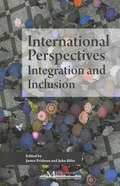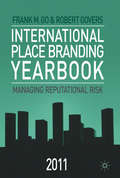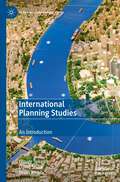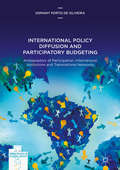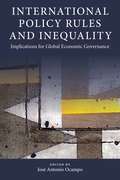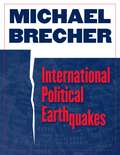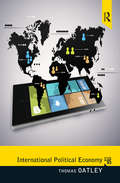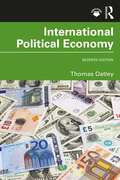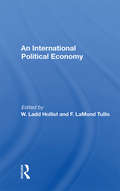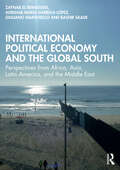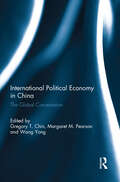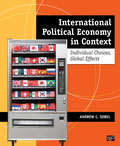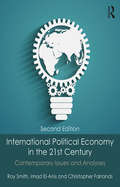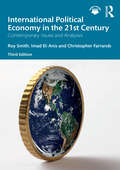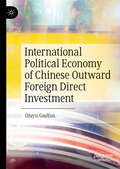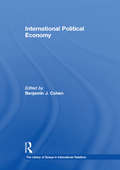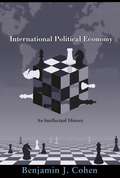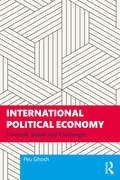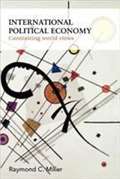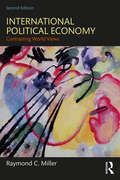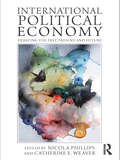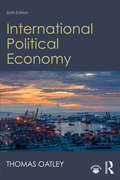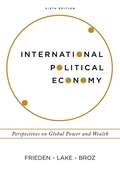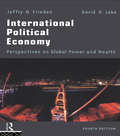- Table View
- List View
International Perspectives: Integration and Inclusion (Queen's Policy Studies Series #164)
by John BilesThe international trend towards migration is growing rapidly and becoming increasingly complex. As the first-wave generation of migrants ages, their children and even grandchildren are reaching adulthood having spent their entire lives in the countries their families chose long ago. International Perspectives: Integration and Inclusion is a wide-ranging exploration of this new, global reality. While many countries have been, and remain, resistant to migration, the sheer volume of people moving from one country to another is forcing public policy and perceptions to change. Migrant inclusion and integration, however, remains an issue in many locales. Insightful and timely, this volume brings together contributions from various countries and levels of the migrant experience in order to consider the ways in which states can facilitate the integration and inclusion of newcomers and minorities.
International Place Branding Yearbook 2011: Managing Reputational Risk
by Frank M. Go Robert GoversThe second annual volume of the International Place Branding Yearbook; this collection looks at the case for applying brand and marketing strategies and to the economic, social, political and cultural development of cities, towns and regions around the world to help them compete in the global, national and local markets.
International Planning Studies: An Introduction (Planning, Environment, Cities)
by Brian Webb David Shaw Olivier SykesThis book provides a comprehensive introduction to the evolving field of international planning studies. It is an essential resource that situates planning as an international discipline and practice with an important role to play in delivering sustainable development across different scales in diverse global contexts. A series of chapters covers past episodes of international influence and exchange in planning, key concepts, research strategies, methods in contemporary international planning studies, as well as ways of characterising and comparing planning systems. The authors explore the emergence of a global agenda for planning, through the activities and goal setting of international organisations, and professional and civil society networks. Transnational and cross-border contexts and initiatives in different global regions, and their relevance to planning, are investigated. An invaluable resource for students and researchers in planning studies, this book offers an important reflection on the internationalisation of planning practice, education, and scholarship, and the future prospects for planning and planning studies from an international perspective.
International Policy Diffusion and Participatory Budgeting
by Osmany Porto OliveiraThis book explores the international diffusion of Participatory Budgeting (PB), a local policy created in 1989 in Porto Alegre, Brazil, which has now spread worldwide. The book argues that the action of a group of individuals called "Ambassadors of Participation" was crucial to make PB part of the international agenda. This international dimension has been largely overlooked in the vast literature produced on participatory democracy devices. The book combines public policy analysis and the study of international relations, and makes a broad comparative study of PB, including cases from Latin America, Europe, and Sub-Saharan Africa. The book also presents a new methodology developed to examine PB diffusion, the "transnational political ethnography", which combines in-depth interviews, participant observation and document analysis both at the local and transnational level.
International Policy Rules and Inequality: Implications for Global Economic Governance (Initiative for Policy Dialogue at Columbia: Challenges in Development and Globalization)
by José Antonio OcampoOver the past decades, the world has seen a dramatic increase in inequality. To what extent have the rules that govern the global economy, formally or informally, affected this trend? How can global governance arrangements be reformed to counteract them?In this book, an interdisciplinary group of prominent scholars scrutinizes how the rules of global economic governance—or the lack thereof—determine the extent and growth of inequality. Economists, political scientists, lawyers, and other experienced contributors bring together cutting-edge research on global rule making and inequality, exploring how international rules can exacerbate inequalities among and within countries to show the crucial interactions between policy choices and the distribution of income and wealth. They provide an in-depth examination of the rules governing foreign-investment protection, cross-border financial flows, and intellectual property rights, as well as the lack of standards governing international taxation and the channels through which they might affect inequality. With a focus on ambitious and achievable reforms, this book offers concrete steps toward global economic governance capable of counteracting inequitable wealth distribution and bringing about fairer economic growth.
International Political Earthquakes
by Michael BrecherInternational Political Earthquakes is the masterwork of the preeminent scholar Michael Brecher. Brecher, who came of age before World War II, has witnessed more than seven decades of conflict and has spent his career studying the dynamics of relations among nations throughout the world. When terrorism, ethnic conflict, military buildup, or other local tensions spark an international crisis, Brecher argues that the structure of global politics determines its potential to develop into open conflict. That conflict, in turn, may then generate worldwide political upheaval. Comparing international crises to earthquakes, Brecher proposes a scale analogous to the Richter scale to measure the severity and scope of the impact of a crisis on the landscape of international politics. Brecher's conclusions about the causes of international conflict and its consequences for global stability make a convincing case for gradual, nonviolent approaches to crisis resolution.
International Political Economy
by Thomas OatleyBroadly viewing the global economy as a political competition that produces winners and losers, International Political Economy holistically and accessibly introduces the field of IPE to students with limited background in political theory, history, and economics.This text surveys major interests and institutions and examines how state and non-state actors pursue wealth and power. Emphasizing fundamental economic concepts as well as the interplay between domestic and international politics, International Political Economy not only explains how the global economy works; it also encourages students to think critically about how economic policy is made in the context of globalization.
International Political Economy
by Thomas OatleyBroadly viewing the global economy as a political competition that produces winners and losers, International Political Economy holistically and accessibly introduces the field of IPE to students with limited background in political theory, history, and economics. This text surveys major interests and institutions and examines how state and non-state actors pursue wealth and power. Emphasizing fundamental economic concepts as well as the interplay between domestic and international politics, International Political Economy not only explains how the global economy works, it also encourages students to think critically about how economic policy is made in the context of globalization. New to the Seventh Edition Includes the disruptive impact of the pandemic on the global economy Includes discussion of climate change, the Green New Deal, and Green Industrial Policy Extended discussion of the impact of great power competition on the global economy and the role weaponized interdependence might play in this competition Considers the impact that Russia’s invasion of Ukraine will have on globalization Introduces full color format
International Political Economy Yearbook: Volume 1: An International Political Economy
by W. Ladd Hollist F. LaMond TullisThe International Political Economy Yearbook will be published annually under the sponsorship of the International Political Economy Section of the International Studies Association at the Department of Political Science, Brigham Young University. The intent of the series is to describe and explain the structure and the dynamic operation of the international political economy and to explore their political, social, and economic impact on different countries, be they advanced market economies, newly industrializing countries, or underdeveloped countries. This first volume is an overview of the policy and research field of international political economy studies. It explores what international political economy is; what approaches and theories might broaden and deepen our understanding of the phenomena addressed; what perspectives seem inappropriate or misdirected; and why neither international relations scholars nor mainstream economists can any longer claim status as senior partners in the community of scholars and policymakers interested in these issues. It also addresses major policy problems confronting both advanced and developing countries, including commodity trade, foreign investment, regulation of multinational corporations, food shortages and other development problems, industrial crises in the United States and Europe, international debt, and the increased role of the state in different economies.
International Political Economy and the Global South: Perspectives from Africa, Asia, Latin America, and the Middle East
by Bashir Saade Giuliano Martiniello Zaynab El Bernoussi Adriana María Garriga-LópezInternational Political Economy and the Global South provides students from both the Global South and the Global North a textbook that speaks to distinct concepts, categories and issues of International Political Economy (IPE) from a Southern and Northern perspective, while identifying how they differ.The primary goal is to provide an alternative or complementary reading of IPE derived from the experiences of the periphery. The textbook asks: how has the Global South responded to the demands of a global economy? What is the meaning of sovereignty to those who have experienced colonialism and imperialism? How can the Global South claim the “international” when the Global North sets its norms, institutions and practices? It opens with a standard introduction, offering an intellectual history of key IPE concepts, including state, firm, capital, power, labor, globalization and finance. Each subsequent chapter follows a similar structure: exploration of the problem; discussion of what may be missing from dominant understandings of the problem and/or how orthodox IPE may tell us something different about the problem compared to what is experienced in the Global South; and identification of alternative frameworks and perspectives.Aiming to de-Westernize and decentralize the production of knowledge, the textbook introduces students to the discipline and phenomenon of IPE with a genuinely global perspective.
International Political Economy in China: The Global Conversation
by Gregory T. Chin, Margaret M. Pearson and Wang YongThis book examines the evolution of international political economy (IPE) as a field of study in China, detailing the evolving boundaries and the content of the field. It surveys how the key themes in IPE, such as the conceptualization of power at the global level, the question of international order and international organization, the state and globalization, money and finance, and the source of ideas and ideational innovation, have been debated in Chinese IPE in comparison to the foundational works of the West. The contributions map the genesis of the field inside China and the core characteristics of Chinese IPE, consider the limits of the development of the field in China, and identify the contributions which Chinese IPE can make to the global development of IPE. Each piece in this collection is co-authored by a prominent PRC scholar residing in China, and a distinguished ‘foreign’ scholar. The co-authors together highlight what they think are the core Chinese concerns of IPE in a particular area, and suggest what this understanding adds to the global discussion.This book was originally published as a special issue of the Review of International Political Economy.
International Political Economy in Context: Individual Choices, Global Effects
by Andrew C. SobelAlthough many international political economy texts offer good descriptions of what events have occurred in global economic and political relations, they make little attempt to develop explicit theoretical frameworks explaining why. Andrew Sobel′s International Political Economy in Context: Individual Choices, Global Effects takes a micro approach to international political economy that considers the fact that individuals—not nations—make choices. Grounding policy choices in the competitive environs of domestic politics and decision-making processes, Sobel illustrates how policymakers choose among alternatives, settling on those that are most in sync with their self-interest. The book is structured to build students′ skills for a sophisticated understanding of how and why events unfold in the international political economy. Students become versed in the primary assumptions and structural/macro conditions of economic and political geography in the global arena. An examination of micro-level conditions and mechanisms introduces the factors that influence political and economic outcomes. Students are then able to use those primary assumptions and micro-level arrangements to make sense of past and present changes in the global political economy. Those familiar with Sobel′s first volume, Political Economy and Global Affairs, will easily find their way through this new book. Anyone looking for a compelling, accessible, and fully integrated rational choice perspective on international political economy will find it here.
International Political Economy in the 21st Century: Contemporary Issues and Analyses
by Imad El-Anis Roy Smith Christopher FarrandsUnderstanding of the theories that underpin international political economy (IPE), and their practical applications, is crucial to the study of international relations, politics, development and economics. This is a comprehensive and accessible introduction to the field, with an engaging and coherent foundation to the subject. It considers traditional and alternative approaches to IPE, and in doing so elucidates key concepts, assumptions and the intellectual and historical context in which they arose and developed. At all times, it makes clear their relevance to issues from trade, finance and government, to environment, technology, health, labour, security, migration, development and culture. The book encourages independent reflection and critical thinking through a range of in-text guiding features. In addition, each chapter presents theoretical analysis alongside contemporary issues, helping the reader to relate to the real world of IPE and to better understand how theory helps inform interpretation of it. New to this edition: comprehensively updated to include key coverage of the post-2015 framework of the Sustainable Development Goals, the financial crisis and international government responses - successful or otherwise - to recent challenges; fully updated data, reflective questions, recommended readings, concept and example boxes, and illustrations; new chapters on health, migration and labour; additional coverage of trade theories and key contemporary issues, such as national versus human security, economic versus human development and illegal networks in global trade.
International Political Economy in the 21st Century: Contemporary Issues and Analyses
by Imad El-Anis Roy Smith Christopher FarrandsUnderstanding the theories that underpin international political economy (IPE), and their practical applications, is crucial to the study of international relations, politics, development and economics. International Political Economy in the 21st Century offers students an engaging and coherent foundation to the subject. It considers traditional and alternative approaches to IPE, and in doing so elucidates key concepts, assumptions and the intellectual and historical context in which they arose and developed. At all times, it makes clear their relevance to issues from trade, finance and government, to environment, technology, health, labour, security, migration, development and culture. The book encourages independent reflection and critical thinking through a range of in-text guiding features. In addition, each chapter presents theoretical analysis alongside contemporary issues, helping the reader to relate to the real world of IPE and to better understand how theory helps inform interpretation of it.This third edition has been comprehensively updated to include: Key coverage of the build-up to and the post-COP26 era; causes and consequences of recent energy crises, and governmental and non-governmental responses to these crises; cryptocurrencies within finance; and the role of ‘big data’ companies. Fully updated data, reflective questions, recommended readings, concept and example boxes, and illustrations. A new chapter on climate change; and a new chapter on energy and energy security. Online material. This comprehensive and accessible introductory textbook will be key reading for undergraduate students of international political economy.
International Political Economy of Chinese Outward Foreign Direct Investment
by Qiuyu GaoYanThis book centers on the political economy behind the internationalization of Chinese multinational enterprises (MNEs). Special attention has been given to the role of political-sided considerations and state policies in their investment strategies during the &“stable period&” (2006 to 2017) when Chinese Outward Foreign Direct Investment (OFDI) witnessed substantial growth, even as the entire world was relatively friendly towards Chinese MNEs. The author uses scientific methods to develop Country Political Risk Index (CPRI)—the first composite index that captures how Chinese MNEs perceive political risk in host countries when making investment decisions, applies it to China Global Investment Tracker (CGIT) dataset developed by American Enterprise Institute (AEI) and interprets the reasons behind the political risk distribution of Chinese OFDI from the standpoint of China&’s holistic approach to national security. Offering by a young scholar with practical experience in business consultancy and M&A projects, this book can help researchers, diplomats and business people better understand how China&’s FDI-related policies empowered Chinese MNEs to venture overseas and emboldened them in the face of unstable investment environments.
International Political Economy: A Reader
by Tsuneo Akaha Kendall W. Stiles"International Policy Economy: A Reader" presents discussions of economic policy issues most frequently addressed by International Policy Economy (IPE) analysts and policy makers: trade, finance, investment, and aid. These policy concerns need to be understood against the backdrop of broad global trends such as changing international leadership patterns, structural changes in the world economy, increasingly crucial relationships between economics and national and international security, and international order.
International Political Economy: An Intellectual History (The Library of Essays in International Relations)
by Benjamin J. CohenPrior to the 1970s, few serious efforts were made to bridge the gap between economics and political science in the study of international relations. Systematic scholarly analysis of International Political Economy (IPE), emphasizing formal integration of elements of orthodox market and political analysis, is really of very recent origin. This volume brings together some of the most important research papers published in the modern field of IPE since its birth less than four decades ago, emphasizing work that has significantly advanced theoretical and analytical understandings. Coverage includes grand questions of systemic transformation and system governance as well as more narrowly focused explorations of the two most central issue-areas of the world economy, trade and money and finance. The introductory essay locates this selection of articles in the context of the field's broad evolution and development to date.
International Political Economy: An Intellectual History (The\library Of Essays In International Relations Ser.)
by Benjamin J. CohenThe field of international political economy gained prominence in the early 1970s--when the Arab oil embargo and other crises ended the postwar era of virtually unhindered economic growth in the United States and Europe--and today is an essential part of both political science and economics. This book offers the first comprehensive examination of this important field's development, the contrasting worldviews of its American and British schools, and the different ways scholars have sought to meet the challenges posed by an ever more complex and interdependent world economy. Benjamin Cohen explains the critical role played by the early "intellectual entrepreneurs," a generation of pioneering scholars determined to bridge the gap between international economics and international politics. Among them were brilliant thinkers like Robert Keohane, Susan Strange, and others whose legacies endure to the present day. Cohen shows how their personalities and the historical contexts in which they worked influenced how the field evolved. He examines the distinctly different insights of the American and British schools and addresses issues that have been central to the field's development, including systemic transformation, system governance, and the place of the sovereign state in formal analysis. The definitive intellectual history of international political economy, this book is the ideal volume for IPE scholars and those interested in learning more about the field.
International Political Economy: Contexts, Issues and Challenges
by Peu GhoshThis book is a comprehensive introduction to the theories and recent debates on international political economy (IPE). It illustrates the theoretical ideas of the discipline and provides an in-depth understanding of regional and global political economy. The book focusses on the functioning of states and the economy within the perspective of world politics. It explores the theories realism, liberalism, liberal interdependence, hegemonic stability and dependency vis-à-vis the contemporary global economic and political scenario. It provides a historical overview of the developments in the field and study of IPE, institutions such as the International Monetary Fund, World Bank and World Trade Organization; the effects of globalization; the movement of capital; and the contested relationship between human development and democracy. The book examines the effects of neoliberal policies on the functioning of states and highlights the challenges and dilemmas of prioritizing development especially for developing countries. The author also looks at regional formations like the EU, NAFTA, ASEAN, SAARC, APEC and BRICS and their contributions to political and economic cooperation and trade. The book will be useful to the students, researchers and faculty working in the fields of political economy, international relations, economics, political science and development studies.
International Political Economy: Contrasting World Views
by Raymond C. MillerAn essential read on international political economy, global governance and international economics, this book provides illustrative case studies, classical and contemporary debates with historical and theoretical explanation.
International Political Economy: Contrasting World Views
by Raymond C. MillerThe second edition of International Political Economy continues to be the perfect short introduction to the fundamental theories and issues of international political economy (IPE). Written in a concise, accessible style by an experienced teacher and scholar, it combines theoretical perspectives, real-world examples, and comparative policy analysis. The text offers students an in-depth, balanced understanding of the contrasting core perspectives in IPE, allowing them to critically evaluate and independently analyze major political-economic events. Having emerged from both the classical and modern schools of political economy, the book’s unique structure is organized around the threefold world view classification of IPE that the author labels as free-market, institutionalist, and Marxist. The book: Compares, contrasts, and critiques the different approaches in the context of major global issues such as financial crises, free vs. fair trade, ecological degradation, growing inequality, gender, globalization, and multinational corporations; Explains key economic concepts such as financial markets, banking systems, monetary policy, foreign exchange, Keynesian economics, fiscal policy, comparative advantage, value theory, money, role of corporations, and ecological economics as well as their relationship to political concepts such as international regimes and governance; Contains 30 original figures and tables, review questions at the end of each chapter, and a detailed glossary to enhance student learning; Responds to the call from eminent IPE specialists Robert Keohane and Benjamin Cohen for textbooks that take a pluralistic approach. This thoroughly updated second edition is essential reading for students of international political economy, economics, political science and global governance.
International Political Economy: Debating the Past, Present and Future
by Nicola PhillipsThe book gathers together a set of lively, provocative essays by leading voices in International Political Economy to debate the evolution of the field, its current state and its future directions. Prompted by recent commentaries on the existence of a ‘transatlantic divide’ in IPE between an ‘American school’ and a ‘British school’, the essays provide a wide-ranging discussion of whether it is useful to think of the field in these terms, what the ‘American’ and ‘British’ schools look like, what their achievements and shortcomings are, and what are the desirable future directions for IPE scholarship. The diverse responses to these questions reflect the ongoing vibrancy and diversity of the field of IPE, and open up an imaginative and engaging discussion about where we need to go from here. Featuring contributions from the most influential scholars in the field from North America, Canada and the UK, this book is essential reading for anyone interested in the cutting edge debates in contemporary international political economy.
International Political Economy: Interests And Institutions In The Global Economy
by Thomas OatleyBroadly viewing the global economy as a political competition that produces winners and losers, International Political Economy holistically and accessibly introduces the field of IPE to students with limited background in political theory, history, and economics. This text surveys major interests and institutions and examines how state and non-state actors pursue wealth and power. Emphasizing fundamental economic concepts as well as the interplay between domestic and international politics, International Political Economy not only explains how the global economy works; it also encourages students to think critically about how economic policy is made in the context of globalization. New to the 6th Edition Covers economic impacts of 2016 electoral events including new Trump administration initiatives related to TPP and NAFTA; UK and Brexit, and the European populist wave. Examines the global financial crisis, EU debt crisis, capital inflows, and development failures. Probes the death of the Doha Round and explores individual trade preferences, WTO dispute settlement, and other trade-related policies and proposals. Considers the question of the Chinese Renminbi as a global currency to displace the dollar.
International Political Economy: Perspectives On Global Power And Wealth
by Jeffry A. Frieden David A. Lake J. Lawrence BrozWith 70 percent new readings, the Sixth Edition of International Political Economy has been extensively updated to reflect changes in the scholarship and the global economy. This compact book brings together a flexible and provocative set of articles and excerpts on a broad range of topics, including the global economic crisis, international migration, and the ongoing challenges in the Eurozone. The text also provides clear introductions and headnotes to help students get the most out of each reading.
International Political Economy: Perspectives on Global Power and Wealth
by Jeffry A. Frieden David A. LakeNow in its fourth edition, this best-selling reader in international political economy offers 31 solid articles - 15 new - by renowned scholars in political science and economics. Frieden and Lake have edited and introduced each reading with care to ensure its accessibility to students who are new to the subject. This reader continues to offer a provocative look at the postive and negative impacts of globalization.
